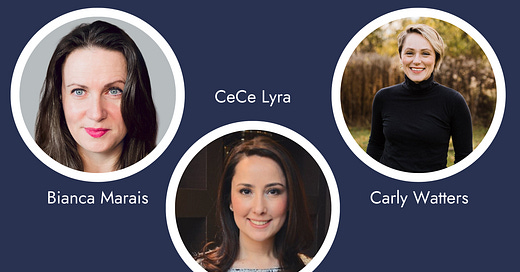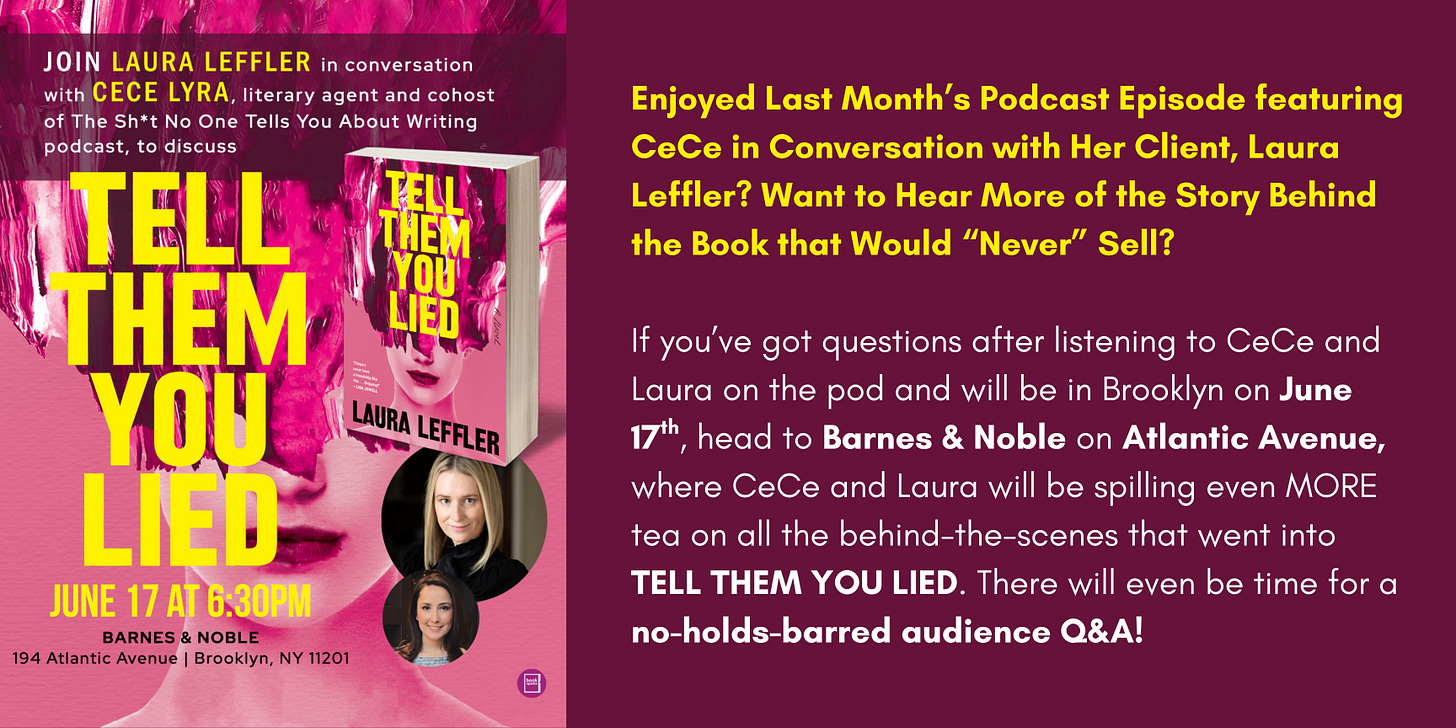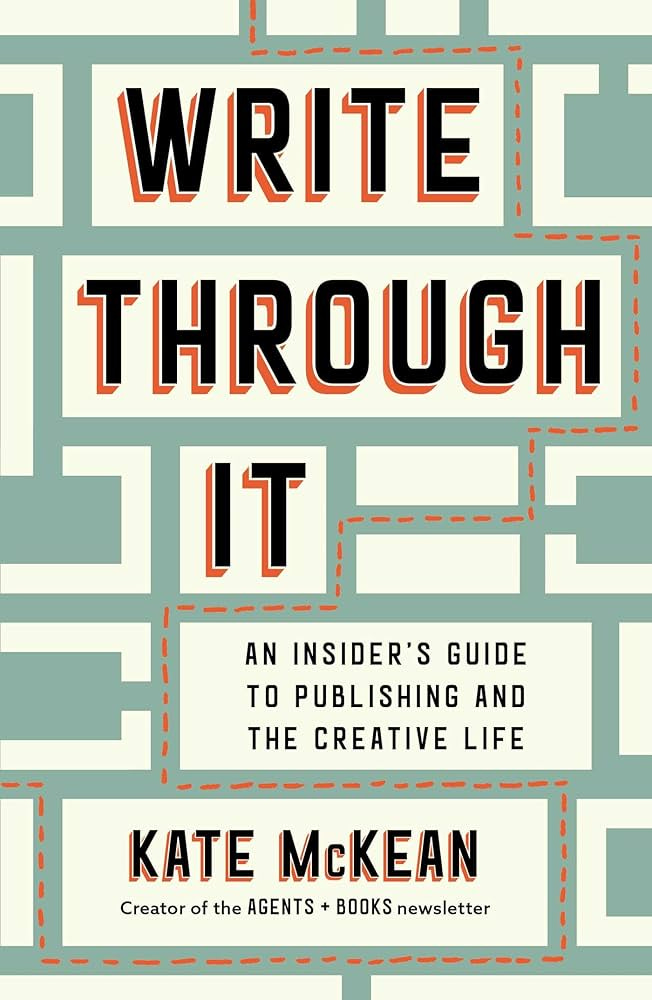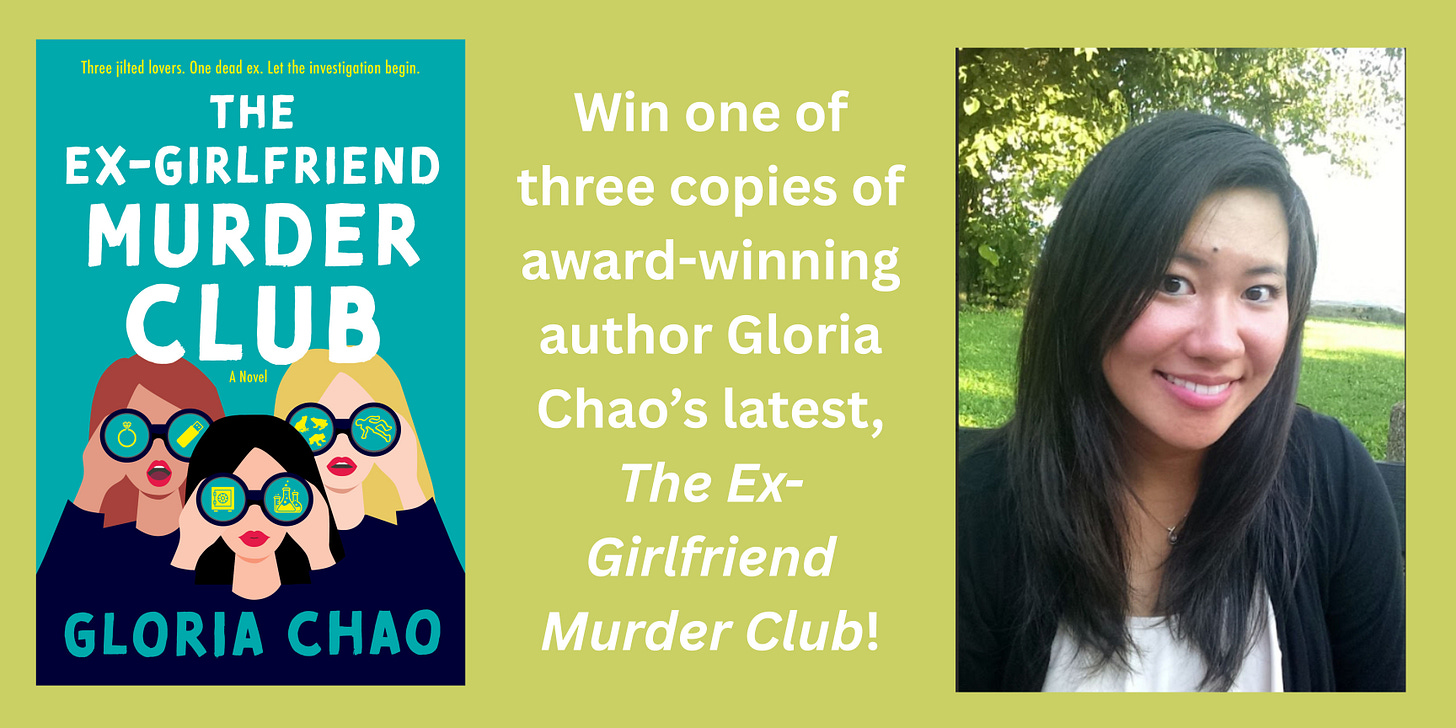✨Michelle Huneven Wants You to Know "Where All the Fun Is" (Hint: It's NOT at the Top of the Bestseller List)✨
Plus, it's Books with Hooks week on the podcast, literary agent Kate McKean is here with tips for surviving self-promotion, and Gloria Chao has a contest for you!
Happy Friday, writing friends!
We reached a HUGE milestone over on the podcast this week, releasing our 200th (!)📕Books with Hooks🪝 episode, and what better way to mark the occasion than with a query containing a hook so good CeCe declared it to be “Possibly the best hook we've seen on Books with Hooks. Definitely top five”! Curious? Tune in to see what it takes in a query letter to grab an agent’s attention and make them anxious to get to your pages. (And, once again, for those who are not so much #TeamBooksWithHooks, a gentle reminder that the insights our hosts provide during these segments are absolutely going to up your writing game, full stop, not just your query letter writing game.)
And speaking of querying…
You guys!!! If your mind isn’t blown by Michelle Huneven’s Q&A today (it’s all really good stuff, but we’re talking specifically about her answer to the question, “How did you get your literary agent?”) we will eat our copy of Bug Hollow (her latest, which publishes next week). Okay, maybe not really, but we will be super-shocked if the story of how she was first rejected then accepted by her agent doesn’t make you feel simultaneously sympathetically horrified (“I would die”), selfishly relieved (“Okay, maybe spelling Carly’s name wrong in that letter wasn’t actually the most embarrassing thing a querying writer could ever do. I can stop self-flagellating now”), and, ultimately, optimistic—if someone can go through that and end being a writer with a book that’s made a half a dozen summer reading lists (including those of the New York Times, Oprah Daily, LitHub, and Kirkus!), there’s hope for the rest of us, too. Because in the end, it’s the quality of your writing, and your willingness to work to improve it, that’s going to sell your book—just as it did for Michelle.
We’ve got a bonus video for you this week by Kate McKean, literary agent and author of Write Through It: An Insider's Guide to Publishing and the Creative Life, and in one of those cool coincidences we love here at The 💩, it feels more than a little like it’s in conversation with Michelle’s Q&A. Kate talks about the importance of self-promotion, something that lots of writers (Michelle most definitely included) count among their least favourite aspects of the writing life, and shares her tips for getting comfortable with it.
If you enjoyed CeCe’s conversation with her client, Laura Lefler, last month and are hungry for more behind-the-scenes on getting Laura’s “unsellable” book sold, be sure to check below for details of their upcoming conversation at Barnes & Noble in Brooklyn on June 17th.
Last, but absolutely not least, we’re excited to announce that Gloria Chao is hosting a giveaway in celebration of her latest, The Ex-Girlfriend Murder Club (coming June 24th!). Keep reading for details, and be sure not to sleep on this one—the deadline for entering is next Tuesday at midnight!
That’s all for now. Thanks for reading! ❤️
The Shit No One Tells You About Writing Team
P.S. Still not sure about upgrading to paid? Check out our Tuesday Teaser below to see what you’re missing!
This Week’s Podcast✨🎙️✨
Pop the champagne—it’s the 200th episode of Books with Hooks! Join hosts Bianca, Carly, and CeCe as they celebrate this major milestone with signature style and sharp writing advice. In this special segment, they dive into two fresh submissions: a gripping crime thriller and a thought-provoking book club novel. Carly and CeCe deliver expert feedback on character depth, narrative hooks, and story structure, while highlighting the power of perspective in storytelling. Packed with practical tips and inspiring insights, this celebratory episode is a must-listen for any writer looking to level up their query game and storytelling craft.
Listen to the episode here or watch it on YouTube!
“I think that you can go deep in third or first person. Both work. It just depends on your writing style…Unless the author is more talented at writing in the first person. But I guess what I'm saying is… I don't want our listeners to think that if you [make the switch from third to first person], that problem will be fixed, because there are books that are written in the third person where you go really deep into someone's psyche.”
-CeCe
Michelle Huneven is Frank, Inspiring & Wise—and We Love Her for It ❤️
Michelle Huneven has written six novels, all of which are set in Southern California, and often in her hometown of Altadena. Michelle teaches creative writing at UCLA. For years she was a restaurant critic and food writer for the Los Angeles Times and LA Weekly, and still writes about food. In 2001, Michelle bought a home in Altadena and lived there until January 2025, when it burned in the Eaton Fire. While rebuilding, Michelle lives in Echo Park with her husband, her dog, her 30-year-old African Grey parrot, and two goldfish. Michelle's books have been New York Times Notable Books and finalists for the LA Times Book Prize and the National Book Critics Circle Award. Michelle is the recipient of a Whiting Award, a Guggenheim Fellowship, a James Beard Award, and a Literature Award from the American Academy of Arts and Letters. She received her master’s in fine arts from the Iowa Writers’ Workshop.
TSNOTYAW: Do you have a go-to mantra or pep talk for the days when writing feels hard?
Michelle Huneven: Yes. It comes from the great radical feminist Mary Daly, who wrote about how she wanted more than anything to write her first book, but somehow she couldn't get down to it: everything else took precedence—grocery shopping, cleaning the house, going to the carwash—over her creativity. She realized she had to reverse that and foreground her creative life. So she came up with a mantra: "I have to turn my soul around." It took some weeks of uttering it, but slowly her creative life, her writing, gained precedence and she began to write regularly. I use that mantra whenever daily life starts dominating, whenever I can't quite get down to work. I have to turn my soul around. I have to turn my soul around...
Were you ever close to giving up on writing and, if so, what stopped you?
I actually did give up writing fiction for a couple of years. I had been trying to write a novel for fifteen years (!)—the same novel! (For some reason, it never once occurred to me to start something else). I'd write 80 or 100 pages and get all snarled up. I was writing restaurant reviews every week to make a living, but fiction had become too hard and too painful. I decided to give it up. But for what? I didn't want to write puff journalism all my life. I wanted to do something meaningful. So I went to seminary to become a UU minister—and trade fiction for sermon writing. I loved every minute of "God school." But in my second year, I had a revelation about what I'd been doing wrong with my abandoned novel (starting it in the wrong place), and then I got a blazing idea for a second novel. I finished the semester and immediately set to work on novel number one. I never did finish my divinity degree. I had truly tried to give up writing, but in the end, I it seems that I was taking a necessary pause to refuel and recalibrate.
What would you say you’ve done right to build a strong and supportive writing network?
In AA they say to talk to another alcoholic every day. I adapted this to writing and talk to another writer every day. I do this because writing is a such peculiar undertaking and only other writers understand its ins and outs. For example: If you tell your mother, "I just read my new chapter and I HATE my writing," she'll say, "Oh honey, you're a wonderful marvelous talented blah blah blah." But if you tell that to another writer, they might say, "Well, that's what you get for reading your own writing!" I would say that those years' long conversations—sympathetic, tough, and truthful—with my writer friends have created deep, loving, mutually supportive bonds. I should also say, my writing friends have been incredibly generous to me in writing blurbs and recommendations, and coaxing me through bouts of self-doubt; I do my best to return those favors in kind.
How do you ensure you have enough time to write amidst so many obligations competing for your time?
I have my own office where I can shut the door and not be disturbed. Before my property burned up in the Eaton Fire, my office was out in the backyard, at a far enough remove from the house so that I didn't have to answer the door or feel the call of dirty dishes or accumulating dust bunnies. That said, the writing life is an interrupted life. There will always be meals, family demands, emergencies, vacations. The trick is to attend to these interruptions, then get right back to writing—it's like breathing meditation: thoughts intrude, but you turn your attention back to the breath. Life intrudes, but you turn your attention back to the page. Also, I get grouchy and depressed when I don't write. When that starts to happen, it's mandatory office time for me.
What is the most challenging part of being a successful author? And how do you mitigate its effects?
How lovely that this question assumes I'm successful! Other than writing itself—which is the great, ongoing, never-ending challenge—I find the promotion of my books the most challenging. I'm an introvert who needs a lot of solitude, which works well for writing. Having to face the public is difficult for me. I'm shy and eternally afraid I'll say something wrong—and often, I do! (I'm a blurter.) I am happy and grateful to do the interviews and profiles that accompany publication—I want my books to have a robust life out in the world—but I'm personally mortified and embarrassed by the exposure. And then there are reviews...As for mitigating this discomfort: when I start feeling too stressed and sorry for myself, I think of how my younger self never dreamed she'd publish six novels or have the writing success I have. For her sake, I try to enjoy publication. Not to sound too woo-woo or hackneyed, but gratitude swiftly eclipses self-pity.
Writer’s block: myth or unfortunate reality? If you experience it, how do you overcome it?
The timer! There are days when I have no ideas, nothing to write about, when I think I might never write again. If that feeling lingers for more than a few weeks, I get out the timer, set it for 20 minutes, and write to a prompt—I have a whole list of prompts I've given my students over the years—126 prompts, in fact. I write by hand on a yellow legal pad without regard to the quality of the prose. I did that recently for 43 days straight (some days were easy, some quite painful) and realized that all kinds of characters and situations were simmering within. Those 20 minute effusions didn't provide me with workable material so much as they re-established a working connection to the generative part of me. After those 43 days, I wrote a novel in a year—a record for me.
What do you wish you had known about writing before you published your debut?
That I had it all backwards. I had such a heady romantic vision of being a published author. In grad school, there was such a focus on "getting published." Afterwards, the focus was on getting out that first book. Publication was not only the goal, but the promised happiness, the culmination...I bought into it. I couldn't wait to go on book tour! I thought that publishing my first novel would automatically induct me into some great literary community and that my whole life would shift into some dreamy writerly realm. In fact, book tours proved often arduous and lonely. Being reviewed was scary. As an experience, publication was, well, diffuse and anti-climactic. The day my second novel was published, my agent phoned and said, "I'm calling just so something will have happened on your pub date!" What I hadn't realized then was that the real glory and satisfaction comes from the writing itself. That, as they say, true success lies not in the destination but on the road to it. Your desk—that's where all the fun is. Writing, thinking about writing, talking about writing, coming up with solutions to the endless problems writing poses—that's where all the satisfaction lies. Falling into research rapture when researching a story or novel. Having a raucous, productive meeting with your writing group. Staring out windows when waiting for your next sentence. Taking long walks to work out a tricky plot element. Writing a really good sentence. Finishing a novel! Oh, writing is incredibly difficult and often hair-tearingly frustrating, but nothing beats it. Publication is the necessary process to reach readers. But writing, creating something from thin air, that is the miracle. A great review, robust sales are encouraging and happifying. But I'll never forget the day I finished my fourth book, Off Course: it hit me that I had now written four novels and at that moment, I was filled with a deep sense of accomplishment—and joy.
How did you get your literary agent? What was the querying process like for you?
My first agent contacted me—one of her clients had recommended me to her. Some years after she approached me, I finally sent her my first novel, all 750 pages of it. Three days later, she called to say she couldn't read it, it was too long, too tiresome and at the very least, it needed to be cut in half. So, over the next six months, I cut it in half. When I sent the trimmed, much more shapely book back to her, I could tell she wasn't so happy to see it. This time she took a month to get back to me. But when she did, she was elated: "I can't believe you did it!" Much later—maybe 3 years later—she told me that she had soundly rejected me as a client with my first submission. I hadn't noticed the rejection. All I'd heard was, "Cut it in half."
You can purchase Bug Hollow on our Bookshop.org affiliate page here. 📚❤️Buying books through this link supports a local indie bookstore, as well as The Shit No One Tells You About Writing 📚❤️
Happening Next Week! 🤩🤩🤩
Kate McKean Says You—Yes, YOU!—Can Learn to Love Self-Promotion 😱😳😍
Boy howdy, but did we ever get a good chuckle out of that one. But if Kate McKean, a literary agent who’s guided more than a few books to the bestseller list, says it’s possible for those of us who’d rather stay hidden behind our keyboards to actually fall in love with talking about ourselves, we’re at least willing to listen (and to be clear, we mean talking about oneself in the media, at events etc. Nobody thinks it’s a good idea for you to tell you blind date your entire life story starting with your parents’ meet-cute and ending with the route you took to the restaurant).
Kate’s perspective is that self-promotion and building an author platform are essential to a writer’s career, and shares practical tips to help you overcome the discomfort so many of us associate with self-promotion. Check it out and let us know what you think!
Kate McKean is a literary agent at the Howard Morhaim Literary Agency in Brooklyn, New York. She is also an adjunct professor at New York University and earned her MA in fiction writing at the University of Southern Mississippi. Her work has appeared in Poets & Writers, Electric Literature, Catapult, and elsewhere. She writes the Agents & Books newsletter at KateMcKean.substack.com
You can purchase Write Through It on our Bookshop.org affiliate page here.
Giveaway Alert!🎉🎉🎉
To celebrate the upcoming release of The Ex-Girlfriend Murder Club, Gloria is giving away copies to three (3) lucky TSNOTYAW fans!
Entering is easy—just do one (or more!) of the following:
1. Post on social media why you're excited to read the book using the hashtag #ExGfMurderClub
Feel free to make your own graphic, or use one of the graphic templates provided here.
2. Sign up for Gloria's newsletter here. All sign-ups within the contest window will be included as an entry. If you're already signed up, just DM Gloria on social media with the email address you're subscribed with.
3. Add the book on Goodreads and share a screenshot of it on socials using #ExGfMurderClubGR
The fine print:
Open to residents of Canada and the U.S.
Deadline: Tuesday, June 17, midnight
One winner will be chosen by random draw from each of the three ways of entering (but you can only win once!)
CeCe is Back with Another Great Course! 😍
The best stories are the ones that make readers feel, which is why learning how to effectively write emotion and write relationships are essential skills for successful storytellers.
The 4-day workshop will cover:
* active vs. passive emotions;
* how to effectively convey emotion (showing vs. telling);
* most common mistakes in writing emotion and relationships (and how to get it right);
* types of relationships and how to leverage each one in a story;
* protagonist’s emotional and relational makeup;
* roles: from love interest to antagonist;
* how to create chemistry between characters;
* different genre expectations;
*
Bonus: the role of emotion and relationships in the query letter; AND MORE!
Tuesday Teaser 😉
Paid members will find Carly and CeCe’s written critiques of the 📕Books with Hooks🪝 queries discussed on this week’s podcast in next Tuesday’s newsletter (and we KNOW you want them after CeCe’s comments this week!). But wait! There’s more…
You’ll also get a Q&A with Erica Peplin (who, among other things, shares just how long she and her agent spent on her debut, Work Nights, before they considered it finished. Anyone discouraged by how long it’s taking them to get their own ms right should read it—and take heart); an essay by Kate McKean, expanding on her excellent video in today’s issue; a video from E.C. Nevin (A Novel Murder) who shares “the suspect equation,” outlining the essential elements for crafting a compelling mystery; and a funny and encouraging essay from Hazel Gaynor (Before Dorothy) on the slippery nature of ideas and how the right ones have a way of finding you.
Not yet a member? For just $8USD a month or $80USD a year you get:
an exclusive newsletter on Tuesdays featuring bonus author Q&As and other exclusive content from industry experts
access to Carly Watters and CeCe Lyra’s written notes on queries from the podcast’s Books With Hooks feature
monthly bonus podcast episodes, AND
regular Ask Me Anythings / Q&As with Carly, CeCe, and Bianca Marais.
If that doesn’t kickstart your writing journey, we don’t know what will!
That’s all for this week’s news! If you enjoyed it, why not share the love? 🥰
Tune in again next week for more invaluable wisdom from our wonderful hosts! Until then, happy writing! 😍
❤️ The Shit No One Tells You About Writing Team
Our work takes place on land now known as Toronto and Ottawa and we acknowledge that these are the traditional territories of the Mississaugas of the Credit, the Anishnabeg, the Chippewa, the Haudenosaunee, and the Wendat Peoples as well as the unceded, unsurrendered territory of the Anishinaabe Algonquin Nation. Toronto is covered under Treaty 13 and the Williams Treaties. We respect and affirm the inherent and Treaty Rights of all Indigenous Peoples across this land and acknowledge the historical oppression of lands, cultures, languages, and the original Peoples in what we now know as Canada. We invite you to learn more about the land you inhabit, the history of that land, and how to actively be part of a better future going forward together at Native Land or Whose Land.
Carly Watters and CeCe Lyra are literary agents at P.S. Literary Agency, but their work in this newsletter is not affiliated with the agency, and the views expressed by Carly and CeCe in this newsletter are solely that of themselves and do not necessarily reflect the views, opinions, policies, or position of P.S. Literary Agency.











This one was juicy, thank you. ❤️